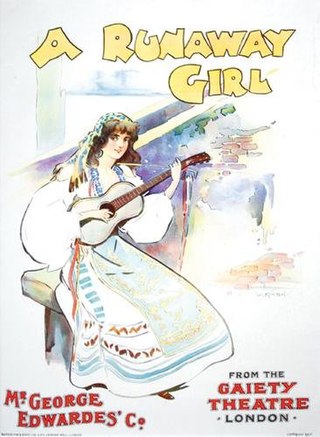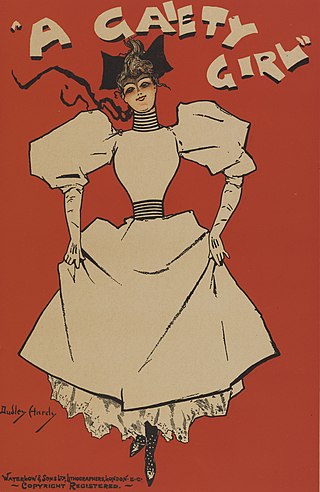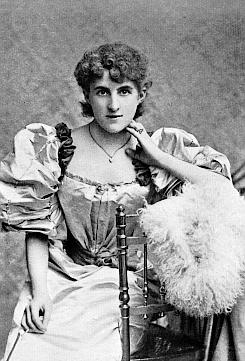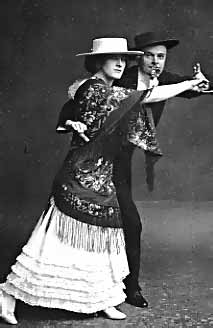
Lionel John Alexander Monckton was an English composer of musical theatre. He became Britain's most popular composer of Edwardian musical comedy in the early years of the 20th century.

A Runaway Girl is an Edwardian musical comedy in two acts written in 1898 by Seymour Hicks and Harry Nicholls. The composer was Ivan Caryll, with additional music by Lionel Monckton and lyrics by Aubrey Hopwood and Harry Greenbank. It was produced by George Edwardes at the Gaiety Theatre, London, opening on 21 May 1898 and ran for a very successful 593 performances. It starred Hicks's wife, Ellaline Terriss and the comic actor Edmund Payne.

Sir Edward Seymour Hicks, better known as Seymour Hicks, was a British actor, music hall performer, playwright, actor-manager and producer. He became known, early in his career, for writing, starring in and producing Edwardian musical comedy, often together with his famous wife, Ellaline Terriss. His most famous acting role was that of Ebenezer Scrooge in Charles Dickens's A Christmas Carol.

The Gaiety Theatre was a West End theatre in London, located on Aldwych at the eastern end of the Strand. The theatre was first established as the Strand Musick Hall in 1864 on the former site of the Lyceum Theatre. In 1868, it became known as the Gaiety Theatre and was, at first, known for music hall and then for musical burlesque, pantomime and operetta performances. From 1868 to the 1890s, it had a major influence on the development of modern musical comedy.

The Circus Girl is a Edwardian musical comedy in two acts with a book by James T. Tanner and Walter Apllant (Palings), lyrics by Harry Greenbank and Adrian Ross, music by Ivan Caryll, and additional music by Lionel Monckton.

The Messenger Boy is a musical comedy in two acts by James T. Tanner and Alfred Murray, lyrics by Adrian Ross and Percy Greenbank, with music by Ivan Caryll and Lionel Monckton, with additional numbers by Paul Rubens. The story concerns a rascally financier who tries to discredit a rival in love; it takes place in London, Cairo and Paris.

A Gaiety Girl is an English musical comedy in two acts by a team of musical comedy neophytes: Owen Hall, Harry Greenbank (lyrics) and Sidney Jones (music). It opened at Prince of Wales Theatre in London, produced by George Edwardes, on 14 October 1893 and ran for 413 performances. The show starred C. Hayden Coffin, Louie Pounds, Decima Moore, Eric Lewis, W. Louis Bradfield, and later Rutland Barrington, George Grossmith, Jr., Scott Russell, Huntley Wright and Marie Studholme. Topsy Sinden and later Letty Lind danced in the piece. Choreography was by Willie Warde. Percy Anderson designed the Japanese costumes for the musical, while the non-Japanese costumes were supplied by leading fashion houses. Blanche Massey was one of the Gaiety Girls in the piece. It also had a successful three-month Broadway run in 1894, followed by an American tour and a world tour.

Daly's Theatre was a theatre in the City of Westminster. It was located at 2 Cranbourn Street, just off Leicester Square. It opened on 27 June 1893, and was demolished in 1937.

Mary Ellaline Terriss, Lady Hicks, known professionally as Ellaline Terriss, was a popular British actress and singer, best known for her performances in Edwardian musical comedies. She met and married the actor-producer Seymour Hicks in 1893, and the two collaborated on many projects for the stage and screen.

George Grossmith Jr. was an English actor, theatre producer and manager, director, playwright and songwriter, best remembered for his work in and with Edwardian musical comedies. Grossmith was also an important innovator in bringing "cabaret" and "revues" to the London stage. Born in London, he took his first role on the musical stage at the age of 18 in Haste to the Wedding (1892), a West End collaboration between his famous songwriter and actor father and W. S. Gilbert.

Lilian Decima, Lady Moore-Guggisberg, CBE, better known by her stage name Decima Moore, was an English singer and actress, known for her performances in soprano roles with the D'Oyly Carte Opera Company and in musical comedies. She was the youngest of ten siblings. Her sister, actress Eva Moore, was the mother of actress Jill Esmond, the first wife of Laurence Olivier.

The Sunshine Girl is an Edwardian musical comedy in two acts with a book by Paul A. Rubens and Cecil Raleigh, lyrics and music by Rubens and additional lyrics by Arthur Wimperis. The story involves a working girl who falls in love with the heir to the factory. He is in disguise and wants to be loved for himself, not his position, so he gets his friend to pose as the heir, leading to complications for both men.

Letitia Elizabeth Rudge, known professionally as Letty Lind, was an English actress, singer, dancer and acrobat, best known for her work in burlesque at the Gaiety Theatre, and in musical theatre at Daly's Theatre, in London.

Edwardian musical comedy is a genre of British musical theatre that thrived from 1892 into the 1920s, extending beyond the reign of King Edward VII in both directions. It began to dominate the English musical stage, and even the American musical theatre, when the Gilbert and Sullivan operas' dominance had ended, until the rise of American musicals by Jerome Kern, Rodgers and Hart, George Gershwin and Cole Porter following the First World War.

Ada Reeve was an English actress of both stage and film. Reeve began to perform in pantomime and music hall as a child. She gained fame in Edwardian musical comedies in the 1890s.

Little Jack Sheppard is a burlesque melodrama written by Henry Pottinger Stephens and William Yardley, with music by Meyer Lutz, with songs contributed by Florian Pascal, Corney Grain, Arthur Cecil, Michael Watson, Henry J. Leslie, Alfred Cellier and Hamilton Clarke. The comedy lampooned the serious plays based on the life of Jack Sheppard, especially the popular 1839 play by John Buckstone, which was in turn based on the novel of that year by William Harrison Ainsworth.

Willie Warde was an English actor, dancer, singer and choreographer. The son of a dancer, his first theatre work was with a dance company. He was engaged to arrange dances for London productions and was later cast as a comic actor in musical theatre. He was associated for over two decades with the Gaiety and Daly's theatres under the management of George Edwardes, playing in and choreographing burlesques and, later, Edwardian musical comedies. In later years he played character roles in West End comic plays.

Coralie Blythe, was an English actress and singer, who is best remembered for her numerous postcard photos and her roles in Edwardian musical comedy. Although she never became a big star, she worked steadily in London's West End and in British provincial theatres from her teen years until after World War I, especially for producer George Edwardes, and had a few roles in America. She sometimes performed with her husband, Lawrence Grossmith, and her brother, Vernon Castle.

Katie Seymour was a British Victorian burlesque and Edwardian musical comedy entertainer who was remembered primarily for her dancing. She was considered, if not the first, one of the first to perform a style of dance called the skirt dance. Seymour began in song and dance routines at a very young age and would go on to appear in a string of highly successful long-running musicals staged at London's Gaiety Theatre during the 1890s. She fell ill in 1903 while on a theatrical tour of British South Africa and died not long after her return voyage home.

Leedham Bantock was a British singer, Edwardian musical comedy actor, early film director, dramatist and screenwriter. In 1912 he became the first actor to portray Father Christmas in film.























